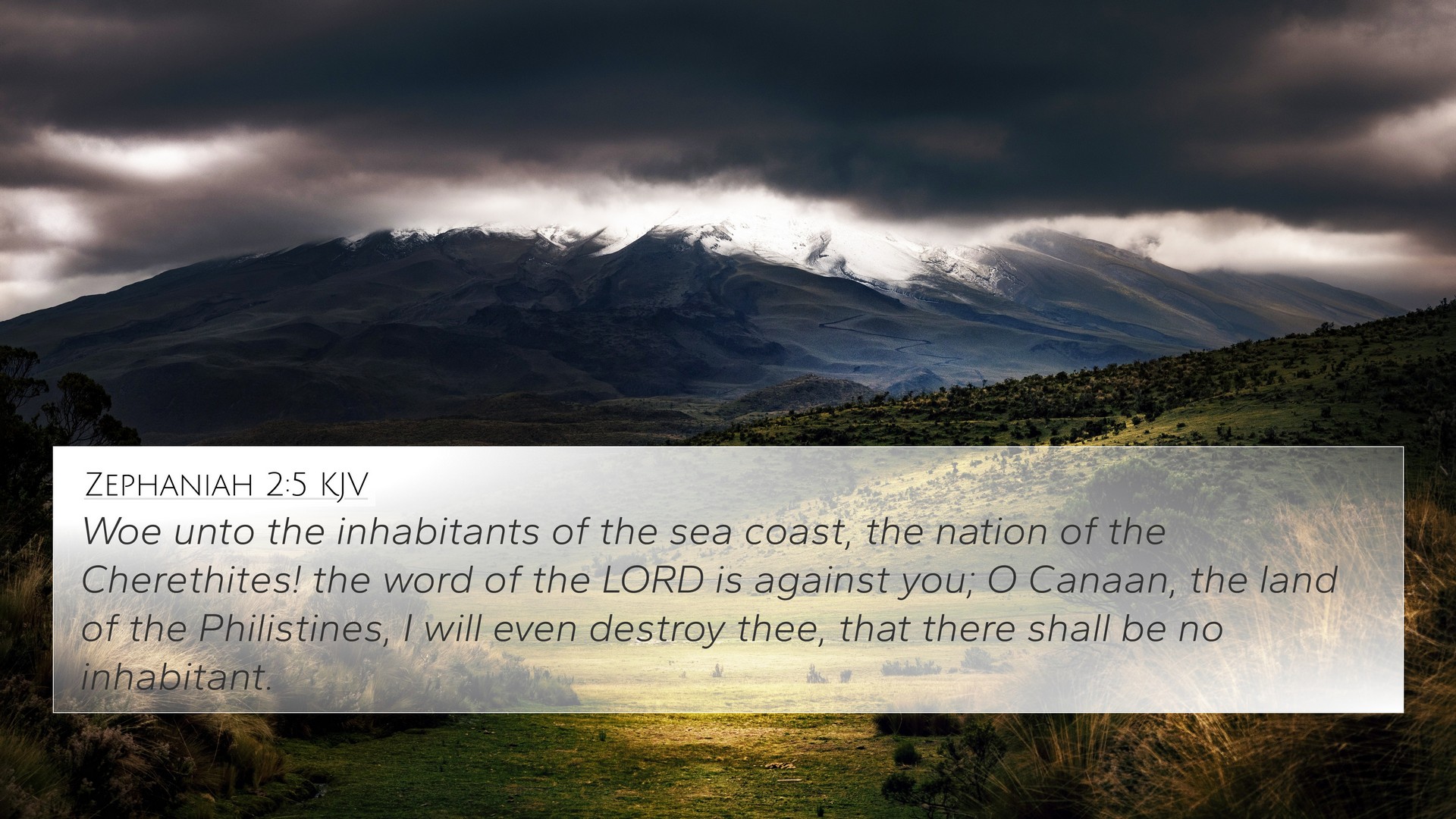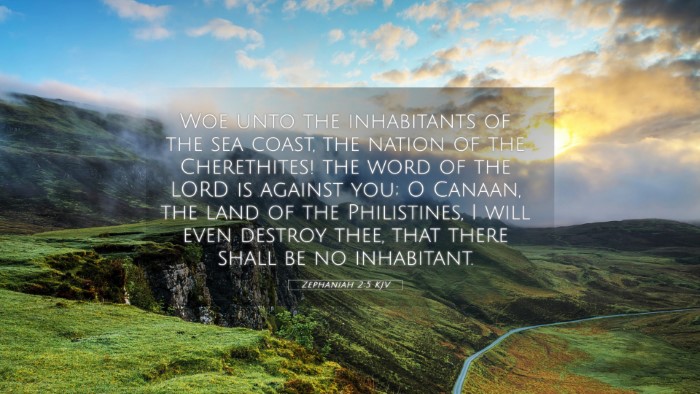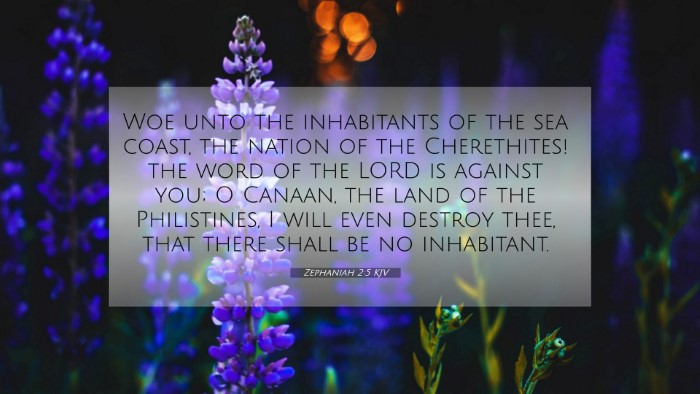Old Testament
Genesis Exodus Leviticus Numbers Deuteronomy Joshua Judges Ruth 1 Samuel 2 Samuel 1 Kings 2 Kings 1 Chronicles 2 Chronicles Ezra Nehemiah Esther Job Psalms Proverbs Ecclesiastes Song of Solomon Isaiah Jeremiah Lamentations Ezekiel Daniel Hosea Joel Amos Obadiah Jonah Micah Nahum Habakkuk Zephaniah Haggai Zechariah MalachiZephaniah 2:5 Similar Verses
Zephaniah 2:5 Cross References
Woe unto the inhabitants of the sea coast, the nation of the Cherethites! the word of the LORD is against you; O Canaan, the land of the Philistines, I will even destroy thee, that there shall be no inhabitant.
Uncover the Rich Themes and Topics of This Bible Verse
Listed below are the Bible themes associated with Zephaniah 2:5. We invite you to explore each theme to gain deeper insights into the Scriptures.
Zephaniah 2:5 Cross Reference Verses
This section features a detailed cross-reference designed to enrich your understanding of the Scriptures. Below, you will find carefully selected verses that echo the themes and teachings related to Zephaniah 2:5 KJV. Click on any image to explore detailed analyses of related Bible verses and uncover deeper theological insights.
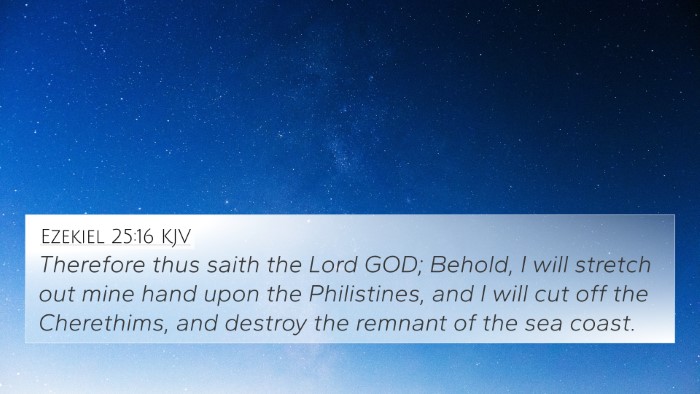
Ezekiel 25:16 (KJV) »
Therefore thus saith the Lord GOD; Behold, I will stretch out mine hand upon the Philistines, and I will cut off the Cherethims, and destroy the remnant of the sea coast.
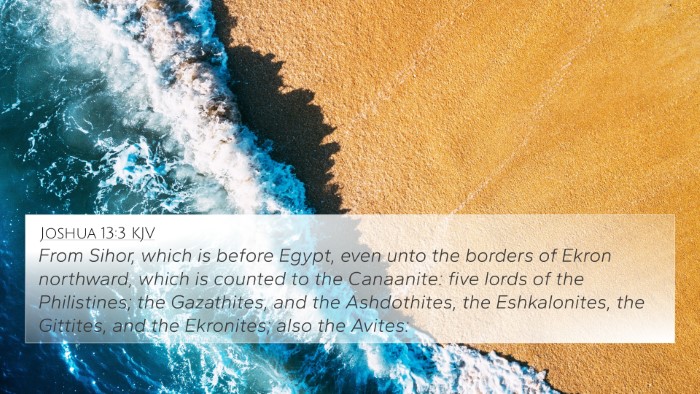
Joshua 13:3 (KJV) »
From Sihor, which is before Egypt, even unto the borders of Ekron northward, which is counted to the Canaanite: five lords of the Philistines; the Gazathites, and the Ashdothites, the Eshkalonites, the Gittites, and the Ekronites; also the Avites:

Jeremiah 47:7 (KJV) »
How can it be quiet, seeing the LORD hath given it a charge against Ashkelon, and against the sea shore? there hath he appointed it.
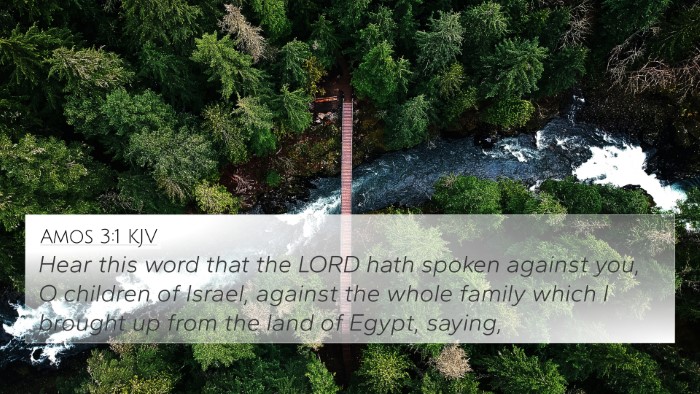
Amos 3:1 (KJV) »
Hear this word that the LORD hath spoken against you, O children of Israel, against the whole family which I brought up from the land of Egypt, saying,
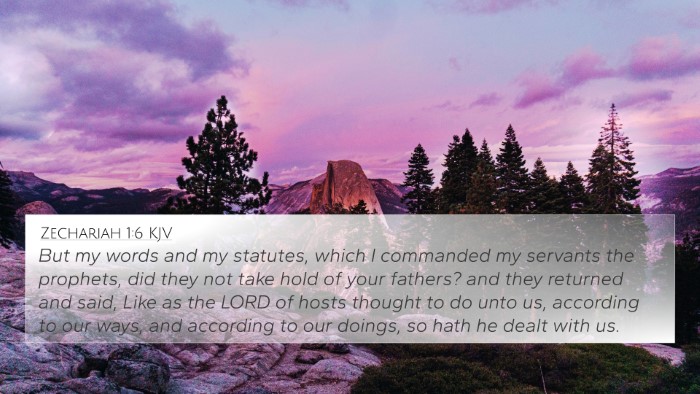
Zechariah 1:6 (KJV) »
But my words and my statutes, which I commanded my servants the prophets, did they not take hold of your fathers? and they returned and said, Like as the LORD of hosts thought to do unto us, according to our ways, and according to our doings, so hath he dealt with us.
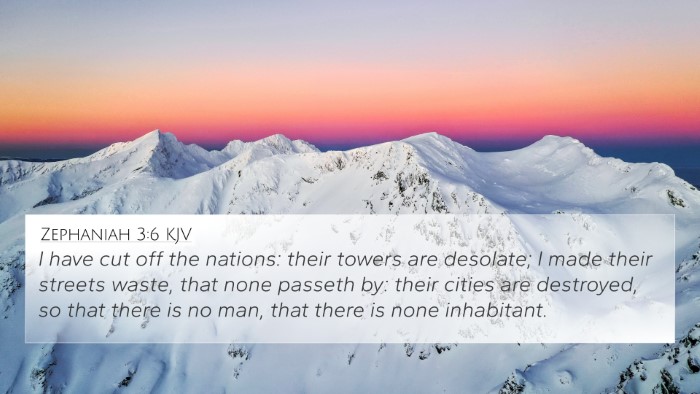
Zephaniah 3:6 (KJV) »
I have cut off the nations: their towers are desolate; I made their streets waste, that none passeth by: their cities are destroyed, so that there is no man, that there is none inhabitant.
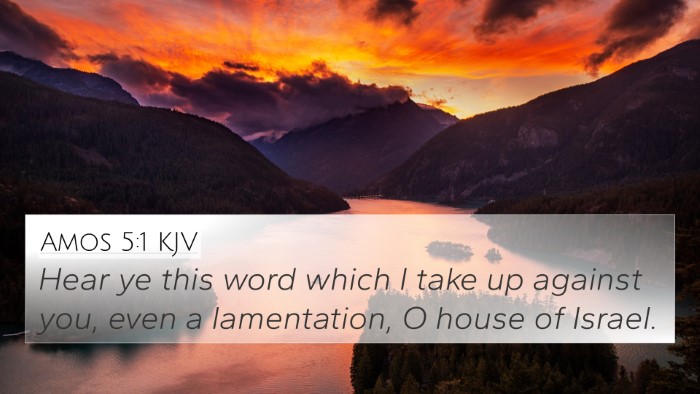
Amos 5:1 (KJV) »
Hear ye this word which I take up against you, even a lamentation, O house of Israel.
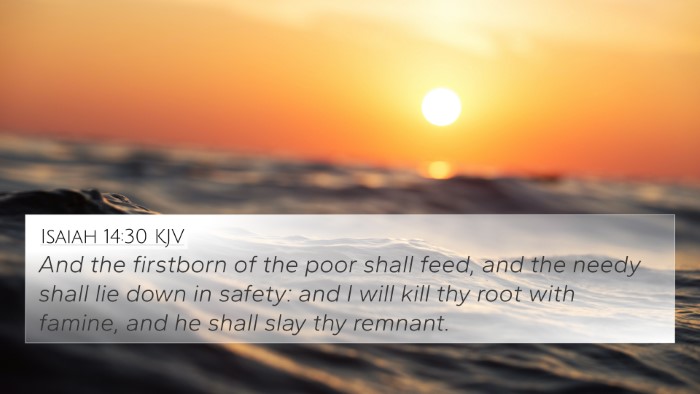
Isaiah 14:30 (KJV) »
And the firstborn of the poor shall feed, and the needy shall lie down in safety: and I will kill thy root with famine, and he shall slay thy remnant.
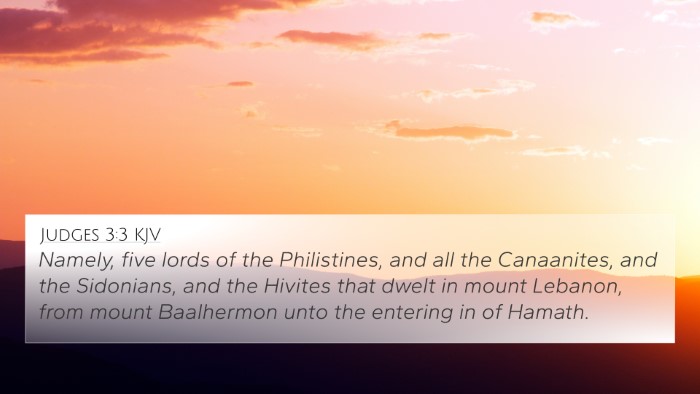
Judges 3:3 (KJV) »
Namely, five lords of the Philistines, and all the Canaanites, and the Sidonians, and the Hivites that dwelt in mount Lebanon, from mount Baalhermon unto the entering in of Hamath.
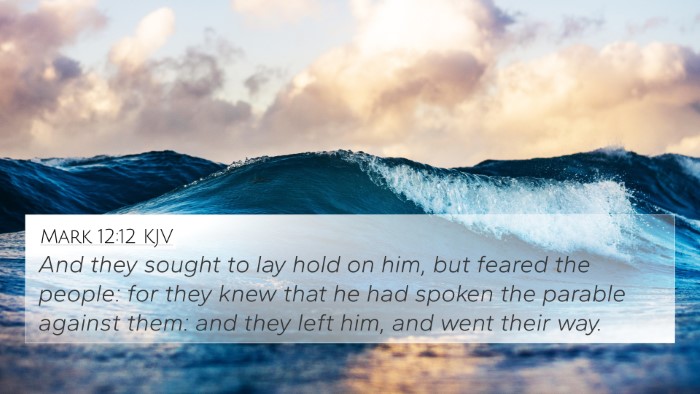
Mark 12:12 (KJV) »
And they sought to lay hold on him, but feared the people: for they knew that he had spoken the parable against them: and they left him, and went their way.
Zephaniah 2:5 Verse Analysis and Similar Verses
Understanding Zephaniah 2:5
Zephaniah 2:5 states, "Woe to the inhabitants of the coast, the nation of the Cherethites! The word of the LORD is against you, O Canaan, land of the Philistines; I will destroy you, so that there shall be no inhabitant."
Summary and Interpretation
This verse highlights a proclamation of judgment against the Philistines, specifically those living along the coast. The use of "Woe" indicates impending disaster and serves as a warning about the consequences of their actions against God.
Insights from Public Domain Commentaries
- Matthew Henry: He emphasizes the gravity of God's judgment on the Philistines, pointing out their historical enmity towards Israel and God. Henry notes that this divine decree signifies the end of the Philistine power, a reflection of God’s sovereignty over nations.
- Albert Barnes: Barnes discusses the geographical significance of the Philistines, likening them to a coastal people destined for destruction. He reflects on the prophetic assurance that even powerful nations cannot stand against the will of God, thus encouraging believers to trust in divine justice.
- Adam Clarke: Clarke elaborates on the identity of the Cherethites and their historical relationship with the Philistines. He suggests that their judgment serves as a reminder that rebellion against God leads to inevitable consequences. Clarke notes the prophetic nature of Zephaniah's message and emphasizes the theme of divine retribution.
Cross-References to Zephaniah 2:5
To understand the connections and implications of Zephaniah 2:5 more deeply, we can explore several related Bible verses:
- Amos 1:8: "I will cut off the inhabitant from Ashdod, and him that holds the scepter from Ashkelon, and I will turn mine hand against Ekron; and the remnant of the Philistines shall perish, saith the Lord God."
- Jeremiah 47:1: "The word of the Lord that came to Jeremiah the prophet against the Philistines, before that Pharaoh smote Gaza."
- Ezekiel 25:16: "Therefore thus saith the Lord God; Behold, I will stretch out mine hand upon the Philistines, and I will cut off the Cherethim, and destroy the remnant of the sea coast."
- Isaiah 14:29: "Rejoice not thou, whole Palestina, because the rod of him that smote thee is broken: for out of the serpent's root shall come forth a cockatrice, and his fruit shall be a fiery flying serpent."
- Zechariah 9:6: "And a bastard shall dwell in Ashdod, and I will cut off the pride of the Philistines."
- 1 Samuel 5:1: "And the Philistines took the ark of God, and brought it from Ebenezer unto Ashdod."
- 1 Samuel 17:47: "And all this assembly shall know that the Lord saveth not with sword and spear: for the battle is the Lord's, and he will give you into our hands."
Thematic Connections and Conclusion
Zephaniah 2:5 speaks not only to the impending doom of a particular nation but also resonates with broader themes found throughout Scripture, such as:
- God's sovereignty over nations.
- The assurance of divine justice.
- The call for repentance before impending judgment.
- Historical context of God’s covenant with Israel.
- The punishment of those who oppose God's chosen people.
This verse invites a deeper understanding of the multi-faceted judgment and grace present in the biblical narrative. As believers, reflecting on such verses can help us grasp God's unwavering stance against sin while also recognizing His mercy towards those who seek refuge in Him. The interconnectedness of Bible verses enriches our understanding and encourages a comprehensive Bible study.
Using Cross-Referencing for Deeper Insights
Employing tools for Bible cross-referencing is invaluable for studying scriptural parallels. A Bible concordance can aid in identifying relevant passages that support or complement each other. Resources like a Bible cross-reference guide facilitate exploring the intricate web of connections across the scriptures, enhancing the understanding of God's Word as a cohesive message.
Final Thoughts
In summary, Zephaniah 2:5 serves as a significant reminder of God's ultimate authority and the consequences of national disobedience. By examining cross-references and exploring thematic connections, one can gain a more profound experience of prayerful meditation and scriptural reflection, leading to enhanced spiritual growth.
